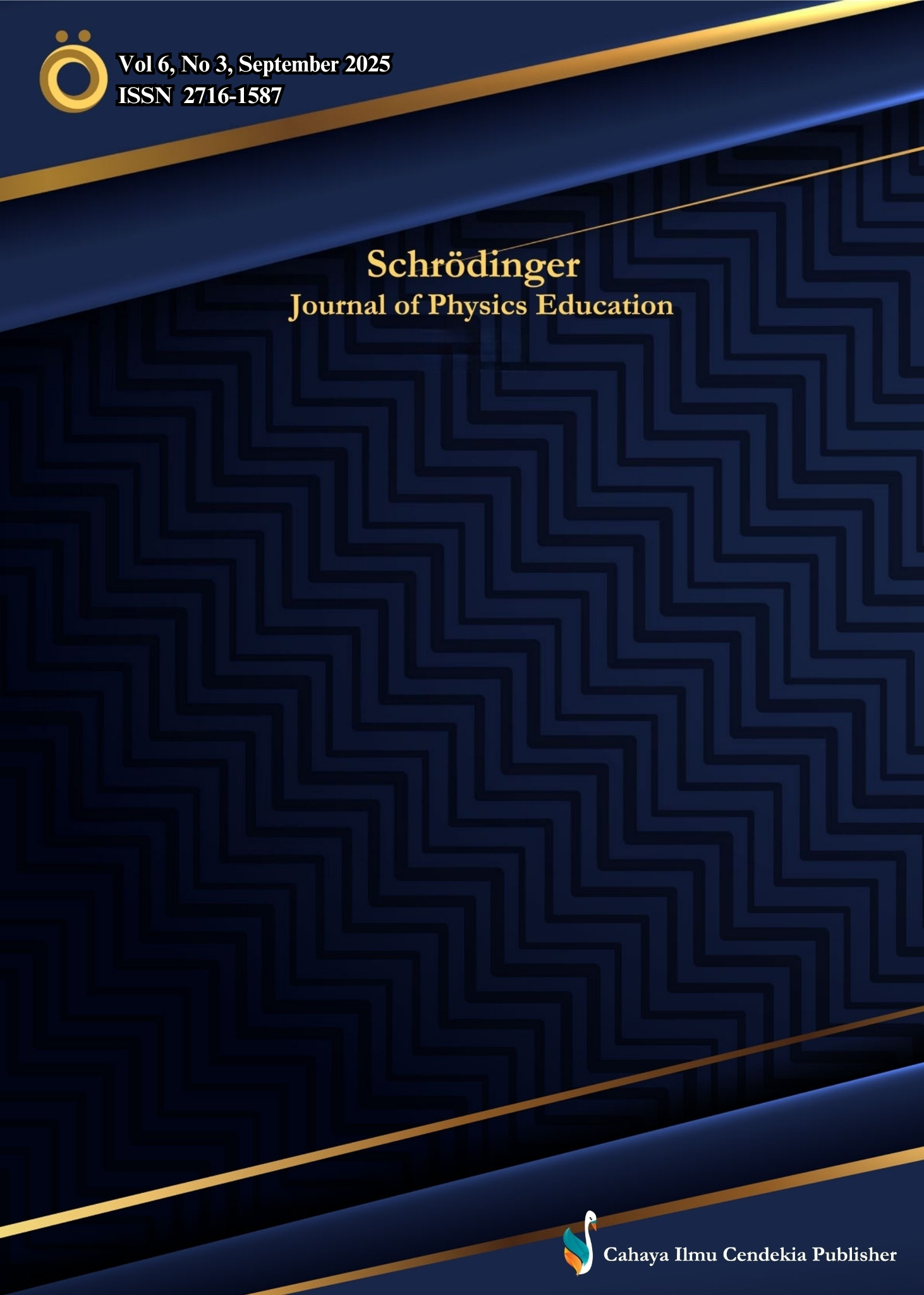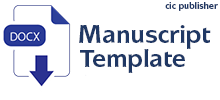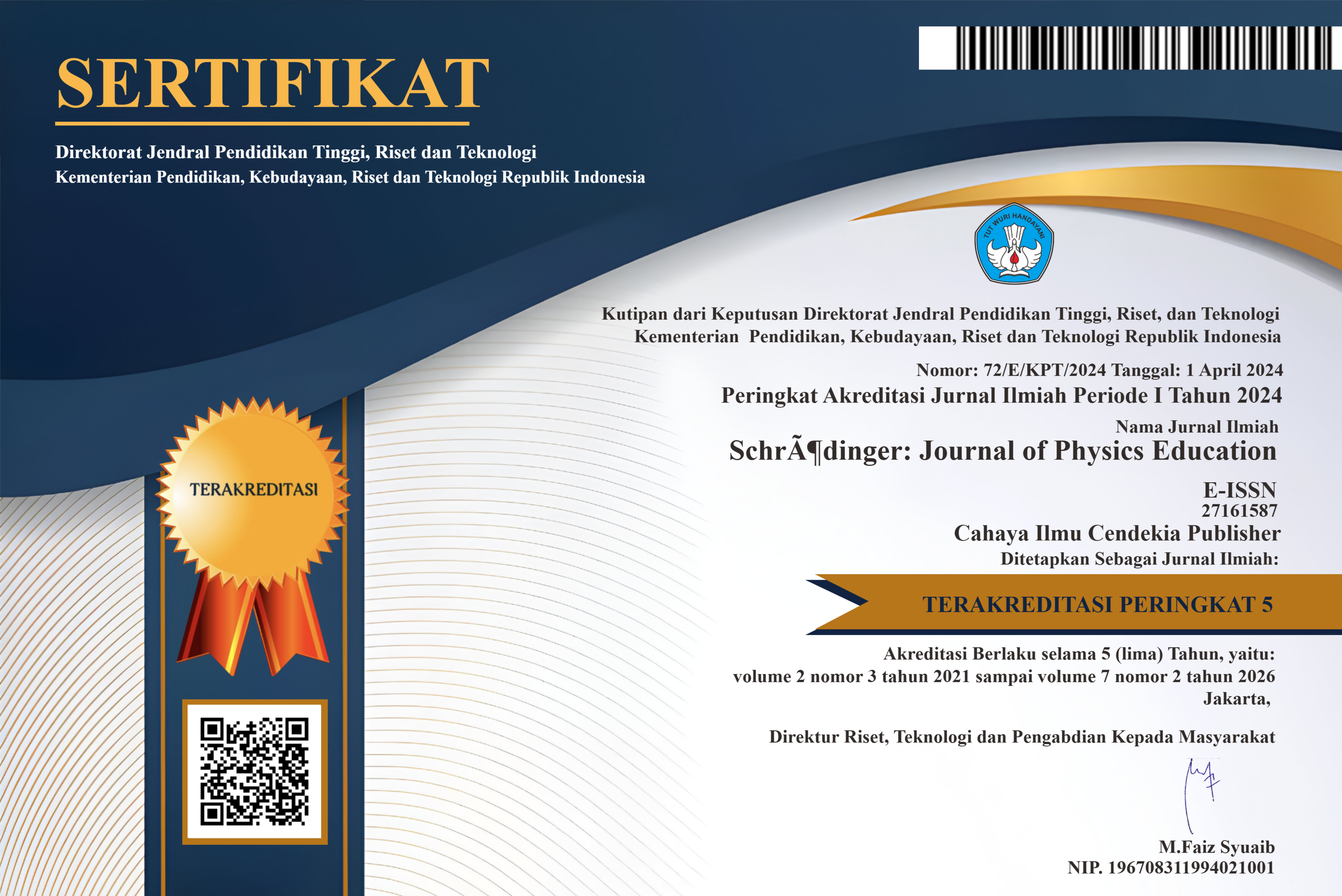TPACK-Based Analysis of Prospective Physics Teachers’ Readiness for Digital Classroom Management
Abstract
Purpose of the study: This study aims to analyze the readiness of prospective physics teacher students in managing digital classrooms based on the TPACK framework, focusing on different semester levels (2nd, 4th, and 6th semesters) in the Physics Education Study Program at Sebelas Maret University.
Methodology: A quantitative survey design was employed using a validated questionnaire based on TPACK indicators (TK, PK, CK, TPK, TCK, PCK, and TPACK). The instrument was measured with a five-point Likert scale. Data were analyzed using descriptive statistics, assumption testing (Shapiro–Wilk, Levene), ANOVA, and non-parametric tests with SPSS software.
Main Findings: Results showed that students’ average readiness scores in TPACK dimensions increased from the 2nd to the 6th semester. Significant improvements were observed particularly between the 2nd and 6th semesters in dimensions such as TK, TPK, and TCK. However, not all semester comparisons showed statistically significant differences, indicating gradual but uneven development of TPACK competencies across cohorts.
Novelty/Originality of this study: This study provides one of the first empirical analyses of TPACK readiness specifically among prospective physics teachers in Indonesia across different semester levels. The findings highlight how extended exposure to digital classroom practices strengthens TPACK competencies, offering insights for curriculum design that address semester-based progression in teacher education programs.
References
Ahmad Yani, “Transformasi teknologi dalam pembelajaran di era revolusi industri 4.0 [Technological transformation in learning in the era of the industrial revolution 4.0],” Jurnal PenKoMi: Kajian Pendidikan dan Ekonomi, vol. 6, no. 2, pp. 43–51, Jun. 2023, doi: 10.33627/pk.62.1235.
R. Syerlita and I. Siagian, “Dampak perkembangan revolusi industri 4.0 terhadap pendidikan di era globalisasi saat ini [The impact of the development of the industrial revolution 4.0 on education in the current era of globalization],” Journal on Education, vol. 07, no. 01, pp. 3507–3515, 2024, doi: 10.31004/joe.v7i1.6945.
Ismiyati, H. Pramusinto, M. Sholikah, and N. D. Yulianti, “Meta-analysis of digital-based learning to improve learning outcomes,” Psychology, Evaluation, and Technology in Educational Research, vol. 4, no. 2, pp. 53–62, 2022, doi: 10.33292/petier.v4i2.114.
T. Maryati and Suklani, “Guru profesional dalam revolusi industri 4.0 di SMKS Manbaul Ulum Cirebon: tantangan dan peluang [Professional teachers in the industrial revolution 4.0 at SMKS Manbaul Ulum Cirebon: challenges and opportunities],” Journal on Education, vol. 06, no. 02, pp. 12449–12465, 2024, doi: 10.31004/joe.v6i2.4953.
Y. Yatun, A. Munir, and P. Retnaningdyah, “Teachers’ TPACK practice of english blended learning course in the midst of covid-19 pandemic [Teachers' TPACK practice of English blended learning course in the midst of covid-19 pandemic],” Linguistic, English Education and Art (LEEA) Journal, vol. 5, no. 1, pp. 19–38, Dec. 2021, doi: 10.31539/leea.v5i1.2754.
A. Çetin, “An analysis of metaphors used by high school students to describe physics, physics lesson and physics teacher,” European Journal of Physics Education, vol. 7, no. 2, Oct. 2016, doi: 10.20308/ejpe.35860.
P. A. Arimbawa, I. W. Santyasa, and N. K. Rapi, “Strategi pembelajaran guru fisika: relevansinya dalam pengembangan motivasi belajar dan prestasi belajar siswa [Physics teacher learning strategies: their relevance in developing students' learning motivation and learning achievement],” Wahana Matematika dan Sains: Jurnal Matematika, Sains, dan Pembelajarannya, vol. 11, no. 1, pp. 43–60, Apr. 2017, doi: 10.23887/wms.v11i1.11846.
A. Halim and M. A. Rizki, “Analysis of technological pedagogical and content knowledge teachers physics overcoming misconceptions Newton’s Law,” JIPF (Jurnal Ilmu Pendidikan Fisika), vol. 9, no. 2, p. 241, Jul. 2024, doi: 10.26737/jipf.v9i2.5173.
R. Große-Heilmann, J. Riese, J. P. Burde, T. Schubatzky, and D. Weiler, “Fostering pre-service physics teachers’ pedagogical content knowledge regarding digital media,” Educ Sci (Basel), vol. 12, no. 7, Jul. 2022, doi: 10.3390/educsci12070440.
D. J. Mourlam, S. R. Chesnut, and H. Bleecker, “Exploring preservice teacher self-reported and enacted TPACK After participating in a learning activity types short course,” 2021. doi: 10.14742/ajet.6310.
S. A. Putri, N. F. Sulaeman, and P. D. A. Putra, “Trend of technological pedagogical content knowledge (TPACK) for pre-service science teacher: a historical review,” Jurnal Pendidikan Fisika, vol. 10, no. 2, pp. 165–175, Apr. 2022, doi: 10.26618/jpf.v10i2.7801.
T. Valtonen et al., “Examining pre‐service teachers’ technological pedagogical content knowledge as evolving knowledge domains: a longitudinal approach,” J Comput Assist Learn, vol. 35, no. 4, pp. 491–502, Aug. 2019, doi: 10.1111/jcal.12353.
S. Alaguraja and G. Ponselvakumar, “Technological Pedagogical and Content Knowledge (TPACK) among prospective teachers,” Thiagarajar College of Preceptors Edu Spectra, vol. 5, no. S1, pp. 74–80, May 2023, doi: 10.34293/eduspectra.v5is1-may23.013.
J. H. L. Koh and C. S. Chai, “Seven design frames that teachers use when considering Technological Pedagogical Content Knowledge (TPACK),” Comput Educ, vol. 102, pp. 244–257, Nov. 2016, doi: 10.1016/j.compedu.2016.09.003.
E. B. Demissie, T. O. Labiso, and M. W. Thuo, “Teachers’ digital competencies and technology integration in education: Insights from secondary schools in Wolaita Zone, Ethiopia,” Social Sciences & Humanities Open, vol. 6, no. 1, p. 100355, 2022, doi: 10.1016/j.ssaho.2022.100355.
M. Koo and S.-W. Yang, “Likert-Type Scale,” Encyclopedia, vol. 5, no. 1, p. 18, Feb. 2025, doi: 10.3390/encyclopedia5010018.
K. S. Taber, “The use of cronbach’s alpha when developing and reporting research instruments in science education,” Res Sci Educ, vol. 48, no. 6, pp. 1273–1296, Dec. 2018, doi: 10.1007/s11165-016-9602-2.
T. K. Kim, “Understanding one-way ANOVA using conceptual figures,” Korean J Anesthesiol, vol. 70, no. 1, pp. 22–26, 2017, doi: 10.4097/kjae.2017.70.1.22.
C. Mircioiu and J. Atkinson, “A comparison of parametric and non-parametric methods applied to a likert scale,” Pharmacy, vol. 5, no. 2, p. 26, May 2017, doi: 10.3390/pharmacy5020026.
O. Wohlfart and I. Wagner, “Longitudinal perspectives on technology acceptance: teachers’ integration of digital tools through the covid-19 transition,” Educ Inf Technol (Dordr), vol. 30, no. 5, pp. 6091–6115, 2025, doi: 10.1007/s10639-024-12954-y.
S. M. Hizam, H. Akter, I. Sentosa, and W. Ahmed, “Digital competency of educators in the virtual learning environment: a structural equation modeling analysis,” in IOP Conference Series: Earth and Environmental Science, IOP Publishing Ltd, Apr. 2021. doi: 10.1088/1755-1315/704/1/012023.
J. Mittelmeier, B. Rienties, D. Tempelaar, G. Hillaire, and D. Whitelock, “the influence of internationalised versus local content on online intercultural collaboration in groups: a randomised control trial study in a statistics course,” Comput Educ, vol. 118, pp. 82–95, Mar. 2018, doi: 10.1016/j.compedu.2017.11.003.
P. Hökkä, K. Vähäsantanen, and S. Mahlakaarto, “Teacher educators’ collective professional agency and identity – transforming marginality to strength,” Teach Teach Educ, vol. 63, pp. 36–46, Apr. 2017, doi: 10.1016/j.tate.2016.12.001.
J. Weyers, R. Ligtvoet, and J. König, “How does pre-service teachers’ general pedagogical knowledge develop during university teacher education? examining the impact of learning opportunities and entry characteristics over five time points using longitudinal models,” Journal of Curriculum Studies, vol. 56, no. 4, pp. 448–467, 2024, doi: 10.1080/00220272.2024.2355923.
B. Ekiz-Kiran, Y. Boz, and E. S. Oztay, “Development of pre-service teachers’ pedagogical content knowledge through a PCK-based school experience course,” Chemistry Education Research and Practice, vol. 22, no. 2, pp. 415–430, 2021, doi: 10.1039/D0RP00225A.
H. Belge Can and Y. Boz, “Development of pre-service teachers’ pedagogical content knowledge and the factors affecting that development: a longitudinal study,” Chemistry Education Research and Practice, vol. 23, no. 4, pp. 980–997, 2022, doi: 10.1039/D2RP00106C.
A. Lefstein, N. Louie, A. Segal, and A. Becher, “Taking stock of research on teacher collaborative discourse: theory and method in a nascent field,” Teach Teach Educ, vol. 88, p. 102954, Feb. 2020, doi: 10.1016/j.tate.2019.102954.
G. Anthony, “Practice-based initial teacher education: developing inquiring professionals,” in Invited Lectures from the 13th International Congress on Mathematical Education, Springer, Cham, Feb. 2018, pp. 1–18. doi: 10.1007/978-3-319-72170-5_1.
D. Mahler, D. Bock, S. Schauber, and U. Harms, “Using longitudinal models to describe preservice science teachers’ development of content knowledge and pedagogical content knowledge,” Teach Teach Educ, vol. 144, Jul. 2024, doi: 10.1016/j.tate.2024.104583.
C. S. Long, P. Harrell, K. Subramaniam, E. Pope, and R. Thompson, “Strengthening elementary preservice teachers’ physical science content knowledge: a 3-year study,” Res Sci Educ, vol. 53, no. 3, pp. 613–632, Jun. 2023, doi: 10.1007/s11165-022-10071-9.
D. Schiering, S. Sorge, S. Tröbst, and K. Neumann, “Course quality in higher education teacher training: what matters for pre-service physics teachers’ content knowledge development?,” Studies in Educational Evaluation, vol. 78, p. 101275, Sep. 2023, doi: 10.1016/j.stueduc.2023.101275.
A. Kılıç, “The impact of reflective practices on pre-service science teachers classroom teaching practices,” Journal of Pedagogical Research, vol. 6, no. 1, pp. 152–170, Mar. 2022, doi: 10.33902/JPR.2022175781.
Y. Wang, X. Gu, and S. Liu, “The investigation and analysis of pre-service teachers toward TPACK competencies,” Open J Soc Sci, vol. 08, no. 12, pp. 327–339, 2020, doi: 10.4236/jss.2020.812027.
K. Gerhard, D. J. Jäger-Biela, and J. König, “Opportunities to learn, technological pedagogical knowledge, and personal factors of pre-service teachers: understanding the link between teacher education program characteristics and student teacher learning outcomes in times of digitalization,” Zeitschrift fur Erziehungswissenschaft, vol. 26, no. 3, pp. 653–676, Jun. 2023, doi: 10.1007/s11618-023-01162-y.
L. Mölgen, R. Asshoff, and B. Heuckmann, “Development and application of a domain-specific tpack questionnaire—findings from a longitudinal study on teaching human biology using digital tools,” J Sci Educ Technol, vol. 33, no. 4, pp. 607–620, Aug. 2024, doi: 10.1007/s10956-024-10108-w.
A. M. Ortiz Colón, T. Izquierdo Rus, J. Rodríguez Moreno, and M. Agreda Montoro, “TPACK model as a framework for in-service teacher training,” Contemp Educ Technol, vol. 15, no. 3, Jul. 2023, doi: 10.30935/cedtech/13279.
J. T. Malusay, S. T. Cortes, J. M. Ontolan, T. P. Englis, G. M. Pagaran, and R. L. Dizon, “Strengthening STEM education through a professional development program on enhancing teachers’ TPACK in selected calculus topics,” Front Educ (Lausanne), vol. 9, 2024, doi: 10.3389/feduc.2024.1487350.
F. Aliustaoğlu and A. Tuna, “Analysis of the pedagogical content knowledge development of prospective teachers in the lesson plan development process: 4MAT Model,” International Journal of Progressive Education, vol. 18, no. 1, pp. 298–321, Feb. 2022, doi: 10.29329/ijpe.2022.426.17.
Y. Anwar, N. Y. Rustaman, A. Widodo, and D. S. Redjeki, “Perkembangan kemampuan pedagogical content knowledge calon guru biologi pada pendekatan konkuren [The development of pedagogical content knowledge abilities of prospective biology teachers in the concurrent approach],” Cakrawala Pendidikan, vol. XXXV, no. 3, pp. 349–356, 2016, doi: 10.21831/cp.v35i3.8251.
X. Li, F. Li, X. Chen, and L. Wang, “Using reflection and dialog feedback to promote the development of situated and dynamic pedagogical content knowledge,” Disciplinary and Interdisciplinary Science Education Research, vol. 6, no. 1, Dec. 2024, doi: 10.1186/s43031-024-00114-8.
N. Nopriyeni, Z. K. Prasetyo, and D. Djukri, “The implementation of mentoring based learning to improve pedagogical knowledge of prospective teachers,” International Journal of Instruction, vol. 12, no. 3, pp. 529–540, Jul. 2019, doi: 10.29333/iji.2019.12332a.
I. Irwanto, I. W. Redhana, and B. Wahono, “Examining perceptions of technological pedagogical content knowledge (TPACK): a perspective from Indonesian pre-service teachers,” Jurnal Pendidikan IPA Indonesia, vol. 11, no. 1, pp. 142–154, 2022, doi: 10.15294/jpii.v11i1.32366.
Y. Ning, Y. Zhou, T. T. Wijaya, and J. Chen, “Teacher education interventions on teacher TPACK: a meta-analysis study,” Sep. 01, 2022, MDPI. doi: 10.3390/su141811791.
N. D. Abunda, “Cross-sectional study on Technological Pedagogical Content Knowledge (TPACK) of mathematics teachers,” Universal Journal of Educational Research, vol. 8, no. 12A, pp. 7651–7659, Dec. 2020, doi: 10.13189/ujer.2020.082551.
M. Greene, S.-L. Cheng, and M. Jones, “Preservice teachers’ technology integration knowledge development in an online technology-based course,” International Journal of Instruction, vol. 16, no. 4, pp. 385–404, Oct. 2023, doi: 10.29333/iji.2023.16423a.
M. D. Greene, S.-L. Cheng, and W. M. Jones, “The impact of an online technology course on pre-service teachers’ technological knowledge: Strategies and design,” International Journal of Professional Development, Learners and Learning, vol. 5, no. 2, p. ep2315, Oct. 2023, doi: 10.30935/ijpdll/13772.
Copyright (c) 2025 Linda Dwi Astuti, Indhah Permatasari, Daru Wahyuningsih

This work is licensed under a Creative Commons Attribution 4.0 International License.
Authors who publish with this journal agree to the following terms:
- Authors retain copyright and acknowledge that the Schrödinger: Journal of Physics Education is the first publisher licensed under a Creative Commons Attribution 4.0 International License.
- Authors are able to enter into separate, additional contractual arrangements for the non-exclusive distribution of the journal's published version of the work (e.g., post it to an institutional repository or publish it in a book), with an acknowledgment of its initial publication in this journal.
- Authors are permitted and encouraged to post their work online (e.g., in institutional repositories or on their website) prior to and during the submission process, as it can lead to productive exchanges and earlier and greater citation of published work.







.png)
.png)








.png)
.png)
.png)







